How do we challenge the mentality which pervades a society?
In the past few years, as I’ve looked at Trinidad and Tobago simultaneously through the eyes of a tourist and as an ex-pat, I have come to appreciate the beauty of the islands. Growing up, we were seldom taken beyond beaches for our fill of nature, and it is only now, as an adult having been away for many of my formative years, that I can fully explore and value what the Republic has to offer. My time in Canada gifted me with a different vision of place, a unique conception of the value of natural capital. It is a vision which, from my experience, tends to be shared among many of those who have ties to other places via temporary relocation for education, or permanent migration. There’s something about “coming home” which encourages one to see the island with a sense of wonder, to appreciate all that you left behind in your departure, and to reminisce over a life here that might have been. It also forces you to take stock of the mismanagement of resources, natural and otherwise, as it becomes abundantly clear that while international tourists tend to threaten environments in many parts of the world, Trinidadians accomplish this just fine on their own.
A few weeks ago I wrote about my experience as part of a small group of local friends out for a “lime” at Caura River. The morning began pleasantly enough as we arrived to the site fairly early and were able to establish ourselves in a relatively secluded spot. But as the day wore on, and more and more people piled in, the result of an overflow from the two “official” picnic pools, the site became unmanageable. Horns blared, music blasted, and garbage piled aside incrementally. This is the unfortunate truth for many Trinidadians “communing with nature”.
My experience at Caura was not an isolated one. Time and time again over my stay here I have ventured to secluded beaches where people have left garbage in overflowing refuse bins or piled into self-made mounds. There is little in the way of grooming and management in these places, the result, in part, of a dearth of public sector workers to tend to these sites. The notion of “pack it in, pack it out”, while acknowledged by some, is still a foreign concept to many and garbage can often be found on secluded hiking trails, stuck into tree hollows, or crammed between rocks. This is not, by any stretch, exclusively a “Third world problem”, and I would be remiss in solely blaming locals, especially when there are many local environmental groups, volunteer organizations, and individuals, that work on projects like beach cleanups. However, given that the majority of tourists to Trinidad take on nature accompanied by guides, it suggests that the responsibility for pollution, and the general state of the environment, hits far closer to home than we would like to acknowledge.
It is worth recognizing, of course, that tourists play their own role in co-creating the mess on beaches and in Trinidadian waterways. A trip to Scotland Bay for a weekend adventure bore witness to a congestive mess of “yachts”, crowding an inlet, overflowing with people. Water in the area, which should have made for a heavenly swim, was an undulating ripple of garbage on the tide. Some of it had accidentally been swept away from picnics on the shore, however the majority was garbage deliberately left to fester in the unrelenting Caribbean sun, forced to churn endlessly in a crash of waves eroding the shore. Aboard those yachts in the inlet were a mix of nationals and internationals alike, sharing the responsibility for the mess. But what we inevitably create with our lack of concern is a “when in Rome” mentality which suggests to visitors that they need not care for an island where its locals care even less. One only needs to look to the streets of Port of Spain during Carnival season, when we wander through avenues thick with strewn litter, to understand that we are deliberately cultivating an inhospitable environment with our lack of respect for ourselves and our home. The party culture that we market ceaselessly, the easy-going nature of island life so attractive to tourists, is simultaneously our downfall.

Scarlett Ibis (Eudocimus ruber) in flight over Caroni swamp
Seeking Sanctuary
Over the past weekend I ventured to the Caroni Swamp for a semi-private bird sanctuary tour with Nanan’s. I joined a handful of fellow photographers for a mini-workshop, many of whom I have been fortunate enough to learn alongside for the past month. I have been to the swamp on several occasions and it is a place I have grown increasingly fond of. While it is an enjoyable sojourn by boat, my favourite way to traverse the watercourse has been via stand-up paddle (SUP) as it allows for the most intimate, silent travel within and among mangroves teeming with nature. Of course, one cannot easily navigate a waterway on a paddle board and simultaneously protect a camera, so this was the first “real” opportunity I had to practice some bird photography in the swamp from the safety of an actual boat. That I was in the company of fellow naturalists, photographers, and bird watchers meant we all had the same goals, and the same unerring patience.
Prior to our departure, our little group of local photography enthusiasts was joined by several elderly bird watchers from the UK. Typical British twitchers (there is a standard sort of “look” about birding enthusiasts!), they didn’t wish to join the raucous, overflowing boats that were waiting to depart, and our group, being fairly accommodating, welcomed them openly. Within short order, it became quickly apparent why the boisterous nature of the other boats would have failed to suit our birders. Most were filled to capacity, and while many individuals were respectful, the usual mix of interests would have meant frustration for dedicated bird watchers.
As we got underway, and waited in relative silence near the edge of the mangroves, other boats in the sanctuary raced past us. Some blared music while others barely contained loud, belligerent individuals, drunk off of a heady mix of alcohol and the thrill of fishing in the protected waters. One such group sped past us, proudly holding aloft a catch, yelling for our attention. (I snapped a photo but as I have little interest in shaming anyone, there’s no need to share it here). Long before we saw the boat, and long after they passed, we could hear them throughout the sanctuary, a refuge designed to facilitate the peaceful enjoyment of nature. Keening cries from “typical Trinis” shattered the tranquility of the mangroves, disturbing birds and scaring off what so many of us had hoped to see. Inevitably, I shook my head at the boundless ignorance, but upon reflection I realized that this mentality is so incredibly common place among Trinidadians, there is no escaping it.
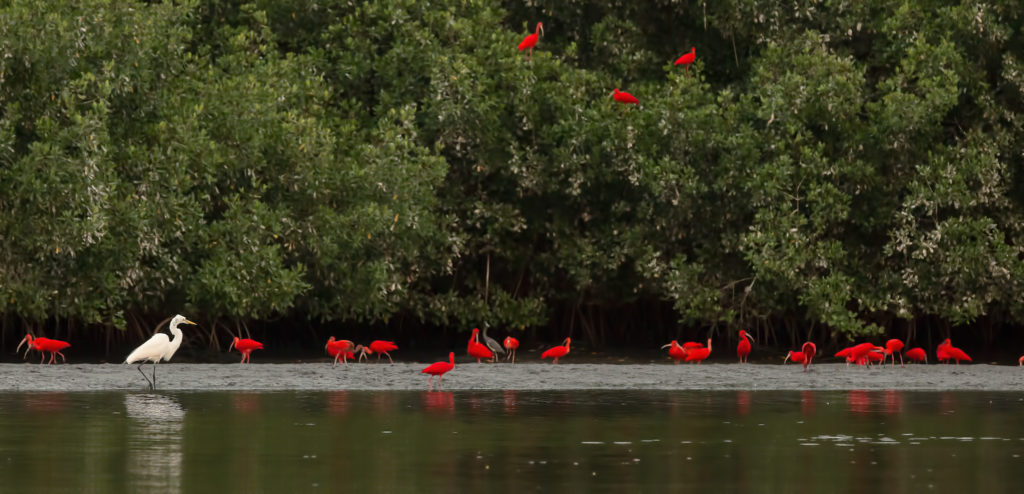
Scarlett Ibis heading in to roost
What culture?
The primary problem that pervades the Republic, not unlike other small island states, is a casual air of indifference and nonchalance. The “party” atmosphere and indolence which popularizes the islands around Carnival season, coupled with an ongoing desire to market the country in this way with little attention paid to anything else, stifles any potential for growth in tourism. The sanctuary, for example, is not policed in any real way. There are no challenges made against those who disturb the peace, and rumours of an illicit drug trade trafficked through the mangroves channels, casually ignored by authorities, only further serves to substantiate the indifferent, hopeless feelings of many citizens. Frustrated individuals decry the lack of vision by the government in promoting a tourism industry that fails to be forward thinking and they simultaneously criticize a classless populace. The truth for Trinidad, in my humble opinion, lies somewhere in between, and for better or worse, Tobago is an afterthought, decoupled from Trinidadian attitudes.
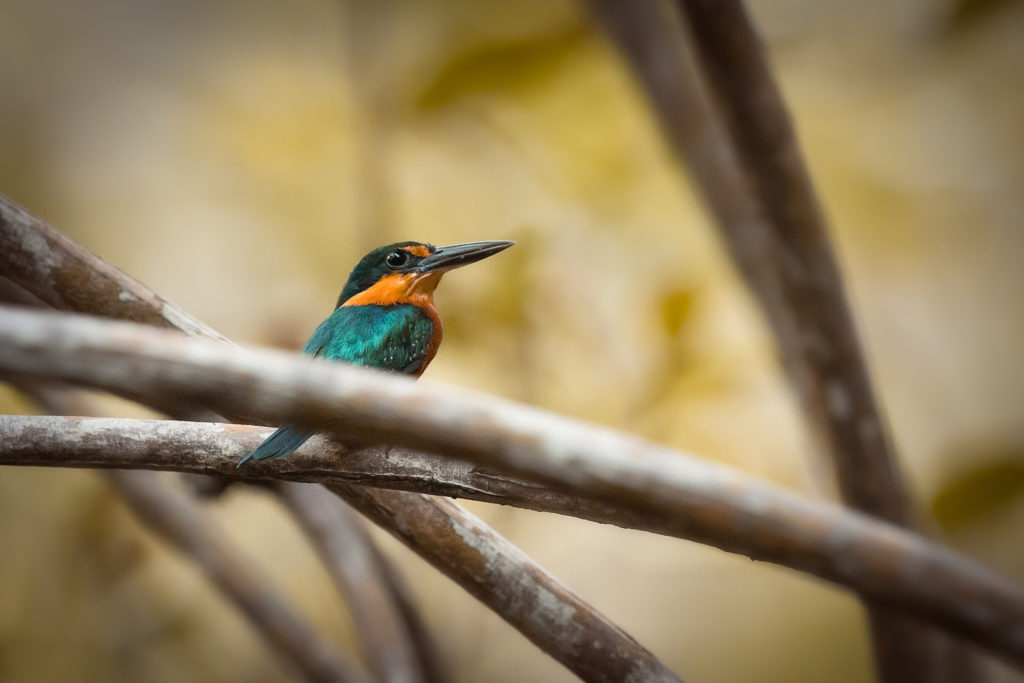
American Pygmy Kingfisher (Chloroceryle aenea)
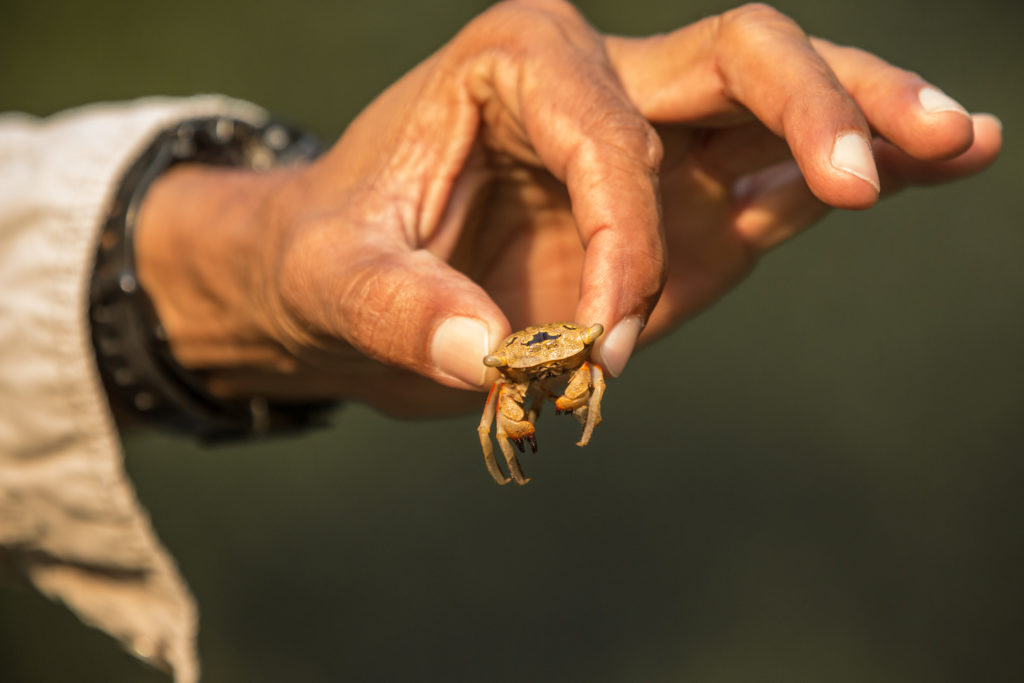
Happy little mangrove crab
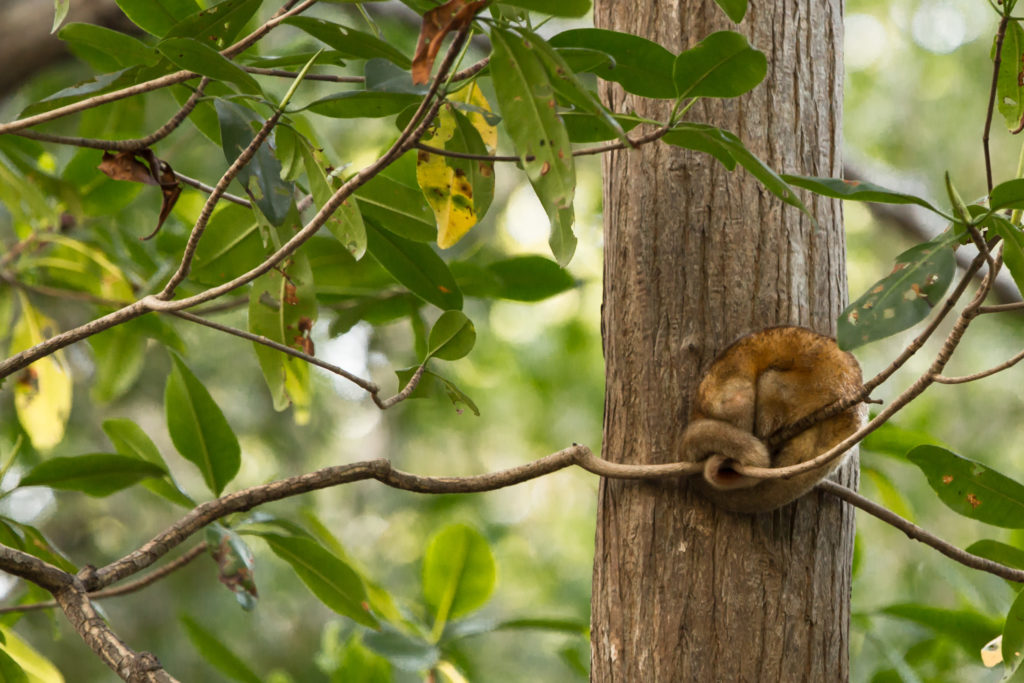
Silky anteater awaiting nightfall
I want to be clear that this is not a criticism. I am as proud to be Trinidadian as I am privileged to be Canadian. But this is a call for us, collectively, to do better. We must take pride in our public spaces, in our beaches, in our rivers, in our forests, in our friends, neighbors, and our government. Now, more than ever, we are in need of visionary thinkers, those who will challenge the collective mentality that keeps our development at bay. Pride in our country should not exist at the far reaches of the world, in presentations and conferences, but should remain on our shores, welcoming our visitors, and welcoming home those of us ready to return to something beautiful.
Forever hopeful,



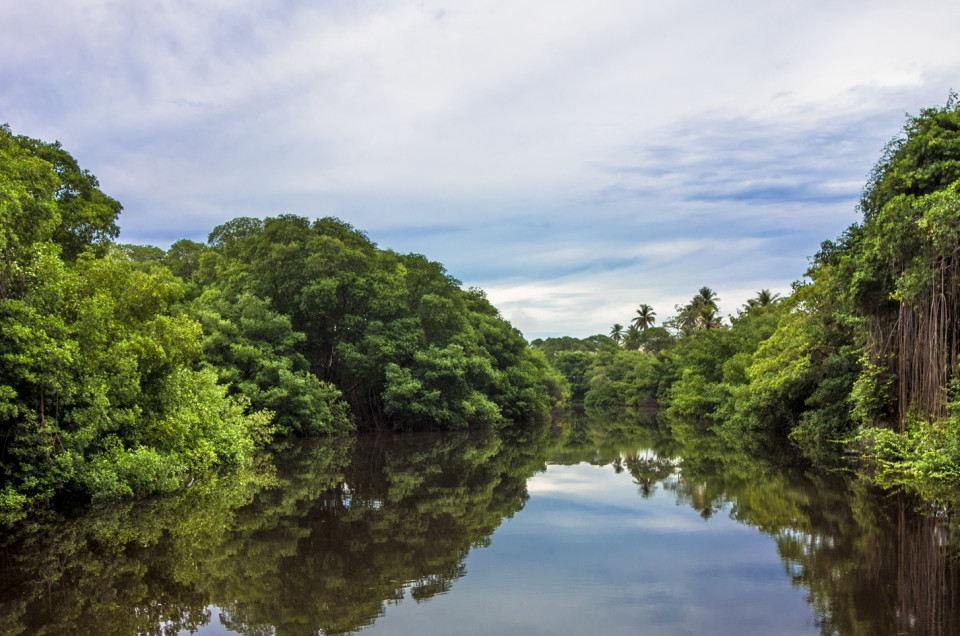
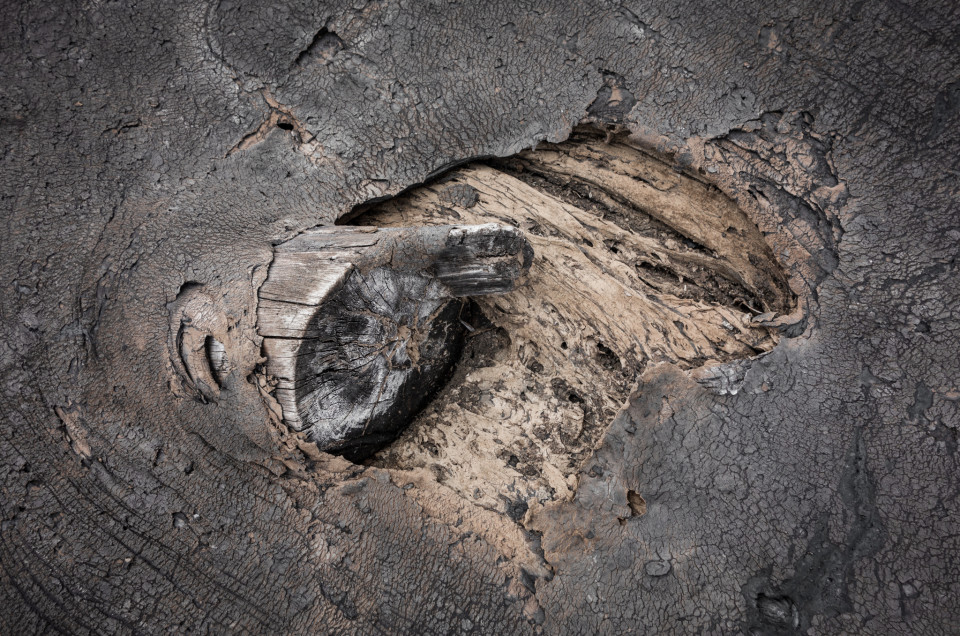
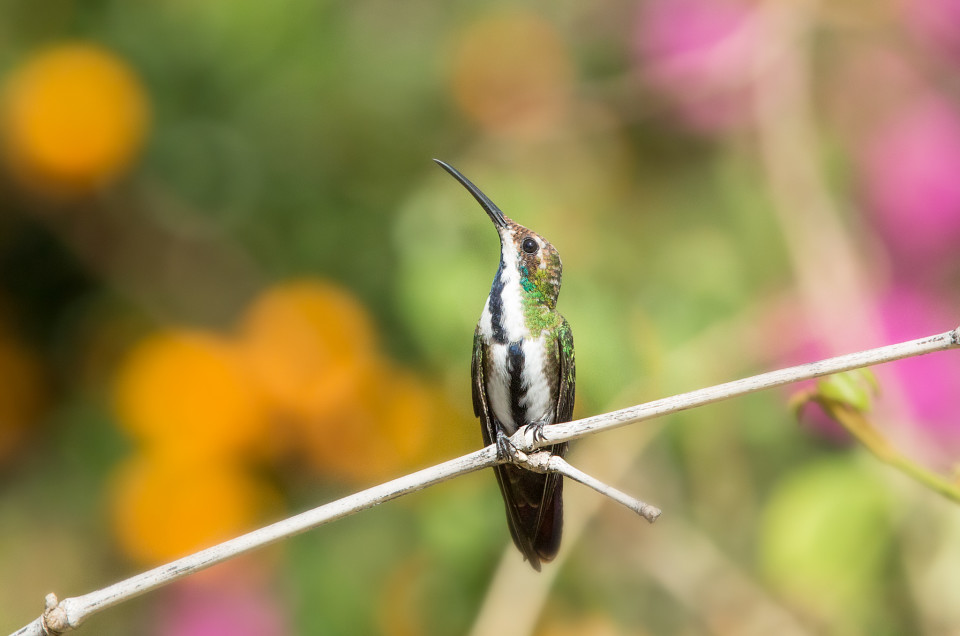


Leave a reply